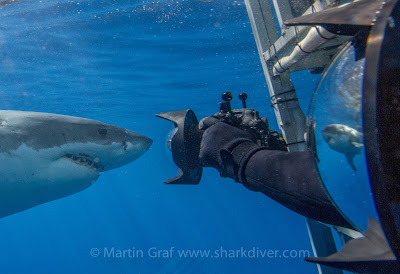Is shark diving beneficial for the sharks?

With the recent coverage of the cage diving accident at Guadalupe, a lot of people have commented that shark diving should be banned.
Obviously my view on that may be biased, since I own a shark diving business, but I have some facts that may change your view on shark diving.
Did you know that shark diving operations have prevented poachers from fishing for sharks at Guadalupe? At this point, everyone knows there are great white sharks at Guadalupe Island, including the poachers. If we would stop shark diving there, the poachers would have easy access.
Did you know that shark diving created a National Marine Park in Fiji? The efforts of Beqa Adventure Divers, have directly led to the creation of the Shark Reef Marine Reserve. When they started diving there, they went to the local fishing village that were the traditional owners of that reef and made a deal with them. They would receive a levy from every shark diver in return for a promise from the village to not fish on that reef. Beqa Adventure Divers also hired and trained their Divemasters, Instructors and boat Captains from that village. After 10 years of diving there, the number of fish species on the reef increased from around 280 to over 480. In 2014 that reef became an official National Marine Park, the equivalent of a National Park in the US.
| Shark Reef Marine Reserve |
Did you know that Shark Diver donates a significant portion of it’s proceeds to research? We primarily support the Marine Conservation Science Institute who created and maintains the photo ID database of all the sharks at Guadalupe Island.
Did you know that Shark Diver started Shark Free Marinas?
Did you know that Shark Diver works to get fishing tournaments to have catch and release divisions, instead of all kill? This is actually something we have been criticized for by people who don’t want to see shark fishing tournaments at all. Well, I don’t like them either, but catch and release is far better than catch and kill. One step at a time!
Shark Diver is just one company among many operators who actively uses the business to support conservation. We try to emulate our buddies in Fiji. Beqa Adventure Divers who state that they are a “Conservation project, masquerading as a dive operation” We have a long way to go, but we are working on catching up.
So how about the issue of conditioning the sharks, by providing them with food? I leave the answer to that question to DaShark who wrote a blog about that issue a while back.
| The late Rusi feeding his sharks. |
He writes:
Conditioning via Positive Reinforcement, the big no-no.
Yes, I confess, this is precisely what we do!
We reward the Sharks whenever they approach, very much in the hopes that over time, more and more of them will turn up for a meal – which of course, being smart Apex Predators, they do!
We do so in order to show them to our clients – as opposed to, as I shall never tire to repeat, Fishermen who do exactly the same thing in order to catch and then kill them.
Get the hint? Who has the way biggest, and most negative impact on the animals? Are we going to abolish fishing as a consequence? I wish!
Just to remind you, this comes from the guy who was largely responsible for creating that national marine park I mentioned above.
There are many, many more reasons I could list that show that shark diving, when done properly can greatly benefit not only the sharks, but the ocean in general. It is easy to just oppose shark diving with often unsubstantiated claims, without taking into consideration what the alternative would be.
How many of you would be interested in sharks, or aware of them, without all the pictures and videos on TV and social media? None of those would be around, if not for shark diving?
Weather you agree with my stand on shark diving or not, let’s agree on something. Just offering our opinions on social media and criticizing others is not saving a single shark. Only actions can do that. Let’s be activists, not slacktivists and keep in mind who is killing sharks. It’s the fishing industry, not shark divers!
Let’s go shark diving! Or clean up a beach or…..
Cheers,
Martin Graf
CEO Shark Diver
About Shark Diver. As a global leader in commercial shark diving and conservation initiatives Shark Diver has spent the past decade engaged for sharks around the world. Our blog highlights all aspects of both of these dynamic and shifting worlds. You can reach us directly at staff@sharkdiver.com.

